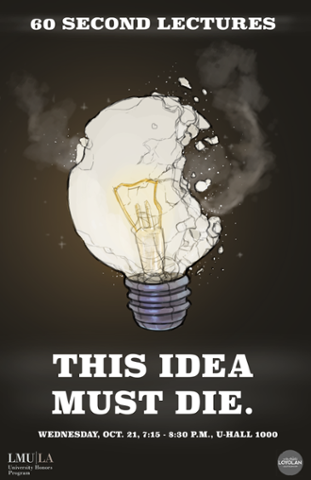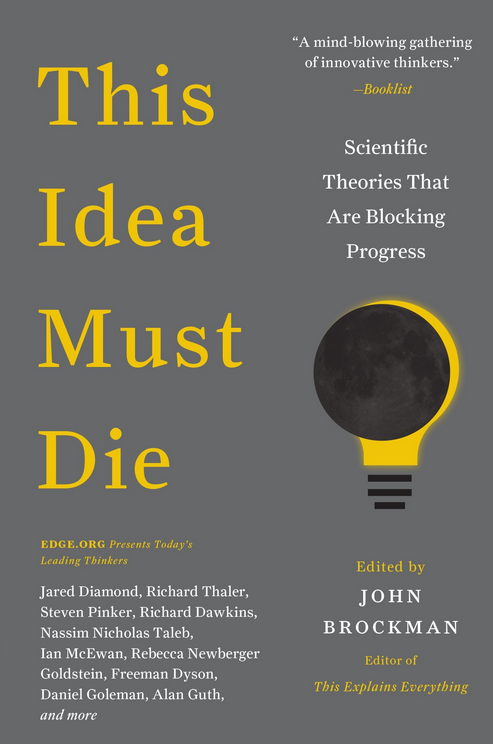Edge in the News: 2014 Annual Question

Every year, since 1998, writer and founder of the site edge.org John Brockman asks dozens of top scientists and different personalities one question. The one in 2014 was like this: Which idea deserves to disappear? ... [W]e might add to the idea that we should try for a self-sufficient way of life.
Even today, this idea enjoys great popularity among many people, for various reasons. Some believe that self-sufficiency will help them to more freedom and independence from many external influences. Self-sufficiency allows them to cut off from the system and gain, for example, energy or food independence. For others, the idea of self-sufficiency is linked to the belief that interdependence outside of their nation or group is something that is untenable in the long run. And another reason is the belief that increasing our self-sufficiency will help solve many environmental problems.
Few ideas have been scrutinized by people as self-sufficiency. The results of these efforts clearly show that it is a bad and misguided idea that has far more negatives than positive.

This month’s Insights column was an attempt to use simple puzzles to highlight the consequences of the infinity assumption in the physical world. The idea was sparked by an article by the physicist Max Tegmark that was written for the book, "This Idea Must Die." Tegmark’s article is excerpted in a blog at Discover magazine under the title, "Infinity Is a Beautiful Concept — and It’s Ruining Physics."

In the 1960s he was a performance artist, he is now a literary agent in New York, his specialty: bringing ideas of renowned scientists to the people. John Brockman...put out a new book, and writes the question..."What scientific idea is ready for retirement?"
"Only a few really new ideas are developed, without giving up first older. In other words, science progresses through a series of funerals ahead. [But] why wait so long? What established scientific idea is mature enough to be pushed aside, so science can move forward?" ...
[E]nlightening and very entertaining.

Nature and nurture are twin words essentially associated with the developmental process of human beings. ... In their 2014 survey of scientists, Alison Gopnik and Edge submit that many respondents wrote that the dichotomy of nature versus nurture has outlived its usefulness, and should be retired. The reason is that in many fields of research, close feedback loops have been found in which “nature” and “nurture” influence one another constantly (as in self-domestication), while in other fields, the dividing line between an inherited and an acquired trait becomes unclear (as in the field of epigenetics or in fetal development). (Edge.org and Gopnik).
Christmas is coming, and the shopping list is getting fat. So we’re here to give you a hand with at least the ideas stage.
Here at Siliconrepublic.com, we’ve spent the last few weeks creating lists of books that the sci-tech lovers in your life will, well… love.
Our first foray into the world of the must-read saw us pointing you in the right direction on books for those who just can’t get their fill of science knowledge – a serious look at the world of science and technology, if you will.
With this latest list, we look at the other side of that coin. Plenty of knowledge here, too, but with a slightly different flavour.
Compiled by John Brockman, publisher of website Edge.org, This Idea Must Die brings together some of the planet’s leading thinkers and asks them, "What scientific idea is ready for retirement?"
Asking the question of 175 of the world’s leading scientists, artists and philosophers, Brockman elicited answers from a huge range of people. … The most famous book produced from the series is likely This Explains Everything, which was published in 2012, while What To Think About Machines That Think has just been published.

Wednesday, Oct. 21: The Loyolan is hosting its second annual "60 Second Lectures" event, co-sponsored by the University Honors Program. Professors from various schools at LMU will deliver lectures on ideas in their field that "must die" in the span of one minute, focusing on the central theme of "This Idea Must Die." "60 Second Lectures" will start at 7:15 p.m. in UHALL 1000.

We used to think that the sun revolved around the earth and that the earth was flat. These ideas have been thrown into the trash. But who throws outdated ideas like IQ, free will and essentialism in the bin?
Scientific Weed (***)
The book "Scientific Weed" collects 179 Edge.org persistent ideas that block progress. A book full of interesting observations from top scientists about their field. ...

You've read The News Journal, but have you ever been curious as to what people who put out The News Journal read?
Staffers weigh in with their latest reads
Matt Albright, Education Reporter
What I'm reading: "This Idea Must Die," by John Brockman
Why you should read it: What if you could get some of the world's leading scientists and philosophers in a room and ask them what scientific idea is most inhibiting progress for humanity? This is basically that in book form. I'll admit some of the more highly-technical scientific answers have flown over my head, but this book is really making me think.

The great discovery that launched the scientific revolution was the insight that humans do not know the answers to their most important questions. It was the discovery of ignorance.
These musings take me back to Edge (www.edge.org), a website founded by John Brockman, a literary agent specializing in serious nonfiction (mostly scientific). Among other endeavors, Edge every year asks a single question of 150-200 leading scientists and researchers. The 2014 question, which particularly titillated me, is best summarized by the title of its published collection of answers (Harper Perennial, 2015):
This Idea Must Die: Scientific Theories That Are Blocking Progress
I find it exhilarating to have so much of our scientific elite capable of questioning the generally accepted wisdom that they have helped create or sustain. To me, this is a typically American phenomenon.
Some years ago, two different Chinese journalists interviewed me and asked the same question, which was very popular at the time: “Do you think China can innovate?” I responded, “If you ask whether Chinese people are capable of innovating, the answer is that we have hundreds or maybe thousands of them innovating every day in Silicon Valley. But to innovate you need a degree of chaos, so the real question is, How much chaos is China willing to accept?”

READ: "This Idea Must Die: Scientific Theories that Are Blocking Progress," ed. John Brockman
"This Idea Must Die" is a fascinating collection of mini-essays from 175 scientific luminaries describing which scientific idea they deem most eligible for falling by the wayside, cushy grants and prevailing vogues be damned. The strength of the essays lies both in their disciplined brevity as well as the remarkable ability of these very brilliant thought-leaders to convey their areas of inquiry in a manner general readers can understand. For those who tend to stereotype the planet's empiricists as plodding, observation-driven technicians, the elasticity of thought and imaginative excursions on display here easily dispel that notion. Surely recognizing and articulating the sacred cows in our midst, as happens here, is one step towards constructing newer, better models.

If New Good Science can’t be trusted to hack away the detritus of Bad Old Science, perhaps we need to exit fully-appointed laboratories altogether for unfunded but informed speculation. That’s where Editor John Brockman’s This Idea Must Die fits the bill nicely.
This Idea Must Die is a fascinating collection of mini-essays from 175 scientific luminaries describing which scientific idea they deem most eligible for falling by the wayside, cushy grants and prevailing vogues be damned. In that sense this book puts speculative self-correction back in the driver’s seat. Think of a Pruner’s Digest that argues for clearing away old brush to make room for the green shoots of tomorrow. ...
This review barely scrapes the surface of what lies in store for the intrepid reader. The strength of the essays lies both in their disciplined brevity as well as the remarkable ability of these very brilliant thought-leaders to convey their areas of inquiry in a manner general readers can understand. ...

...Our innovative journey toward change involves inquiry, curiosity and doubt. Much of this we do the same way the Wright’s did – by letting the world know of our thoughts and views. Any proponent of change has to proclaim his/her thoughts. Galileo, one of the greatest astronomers and scientists of all time, defended his views on heliocentrism in Dialogue Concerning the Two Chief World Systems. Philosophers such as Plato, Kant and Nietzsche, and many others, published their thoughts that changed the world in outlook and philosophy. A new innovative book This Idea Must Die edited by John Brockman takes us through scientific theories and practices that are blocking our progress. At a recent interview, Brockman said: "Daniel Kahneman has studied human rationality and found out that characteristics we thought we had as humans aren’t necessarily the case. We are not HOMO ECONOMICUS, we’re not the rational human beings we thought we were. A lot of what we do is pre-conscious and without acknowledgement."...
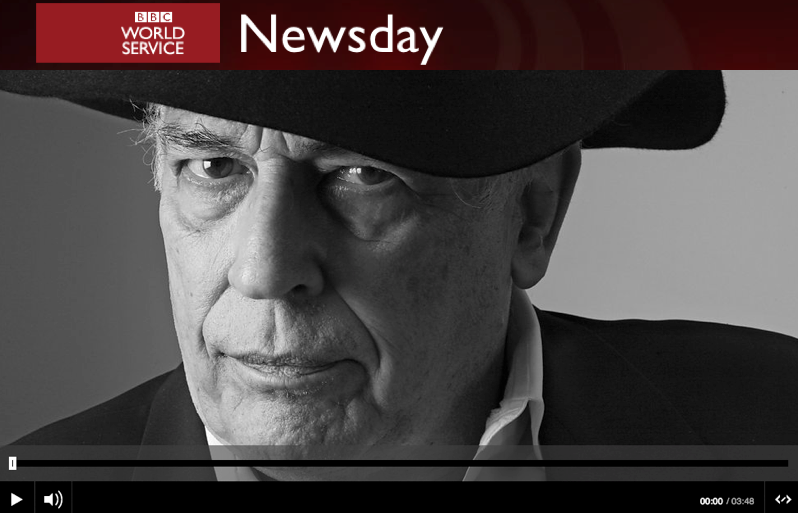
Are there scientific ideas that have become too old and are actually blocking progress instead of enabling it? According to John Brockman - publisher of the world's smartest website Edge.org - there are. So he challenged the greatest scientists, artists and philosophers to answer the question: "What scientific idea needs to be retired in order to make room for new ideas to advance?" The answers he put into a book of 175 essays that he called "This Idea must die". Lawrence Pollard has been speaking to John Brockman.
It all started with a young scientist named Laurie Santos at a conference that I ran saying, “How do we get rid of some of these ideas that are just standing in front of us? Just blocking everybody?” A lot of these ideas have to do with being promulgated by elderly, white males still alive whose names are attached to them. It comes down to is science advertising or is it argument?

On his website Edge.org, John Brockman—an idea guru—interviews and opens dialogues with the century’s brightest minds (many of which he represents as their agent). Every year, he publishes a book that poses an unsettling question to philosophers, scientists, and other kinds of big thinkers. This is how he’s come up with his 'question books,' such as WHAT SHOULD WE BE WORRIED ABOUT?, WHAT HAVE YOU CHANGED YOUR MIND ABOUT?, WHAT IS YOUR FAVORITE DEEP, ELEGANT, OR BEAUTIFUL EXPLANATION?, and WHAT IS YOUR DANGEROUS IDEA? Reading through the answers (both on the website and in these annual question books) would be an excellent way for extraterrestrials to figure out what’s going on in the minds of those crazy humans.

Few will dispute the fact that this world we live in is built on ideas. They encompass anything between the ideals of democracy to the relatively more recent technological conveniences such as the Internet. ...
Some of these have been discussed in a new book titled, "This Idea Must Die: Scientific Theories That Are Blocking Progress." This is the latest in a series of annual books posing a question every year to some of the best minds.
The brainchild of John Brockman, the founder of the intellectually stimulating edge.org, the current book is a compendium of answers to the question, "What scientific idea is ready for retirement?" posed to 175 of the world's greatest scientists, philosophers, and writers.
As Brockman explains it, few truly new ideas are developed without abandoning old ones first. And, as theoretical physicist Max Planck (1858-1947) noted, "A new scientific truth does not triumph by convincing its opponents and making them see the light, but rather because its opponents eventually die, and a new generation grows up that is familiar with it." ...

Daniel Dennett wants to convince Tom Stoppard that there is no Hard Problem.
Dennett, on the other hand, thinks that we may have already solved the problem of consciousness with a coterie of small-scale, rather banal explanations. The non-mysterious ways in which the brain creates our sensory experience might be the only ingredients we need to explain how it is that we are aware of feeling something.
He expands on this possibility in his contribution to a new collection of essays at edge.org that asks the question: “What scientific idea is ready for retirement?” He chooses the Hard Problem (even though, he says, it isn’t actually a scientific idea) and suggests we should approach all of its difficulties in the same way as scientists approach extrasensory perception and telekinesis: as “figments of the imagination”. ...

Recommendations of recent books from the staffs of a rotating list of Bay Area independent bookstores. This week’s list is from Copperfields Books, Santa Rosa
Nonfiction
A KIM JONG-IL PRODUCTION: THE EXTRAORDINARY TRUE STORY OF A KIDNAPPED FILMMAKER, HIS STAR ACTRESS, AND A YOUNG DICTATOR'S RISE TO POWER, by Paul Fischer: A jaw-dropping book about the former North Korean leader’s atttempt to boost the reputation of his country’s filmmaking industry.
THIS IDEA MUST DIE: SCIENTIFIC THEORIES THAT ARE BLOCKING PROGRESS, by John Brockman: Want a dinner party guaranteed to produce intense and lively conversation? Introduce Brockman’s book!
BETWEEN YOU AND ME: CONFESSIONS OF A COMMA QUEEN, by Mary Norris: This is a fabulous meandering ride through language, the pursuit of a good pencil and how best to say what you mean, from the New Yorker’s copy editor.
UNEXPECTED ART: SERENDIPITOUS INSTALLATIONS, SITE SPECIFIC WORKS AND SURPRISING INTERVENTIONS, by Jenny Moussa Spring: Imagine turning the corner toward the harbor in Auckland, New Zealand, to discover a 60-foot bright yellow rubber duck quietly floating there. This modest art book is full of astonishing, inventive and delightful art installations around the world.

#19—This Idea Must Die: Scientific Theories That Are Blocking Progress (HarperPerennial) edited by John Brockman.

NONFICTION Bay Area
The Edge Question Book, This Idea Must Die is #6 on the San Francisco Chronicle's Best-Seller List, March 22nd.

The Edge Question Book, This Idea Must Die is #15 on the National Indie Bestseller List, Week Ending March 15th.
Brain plasticity, godlessness, Malthusian notions - all should go according to the responses to John Brockman's latest question
THE physicist Max Planck had a bleak view of scientific progress. "A new scientific truth does not triumph by convincing its opponents..." he wrote, "but rather because its opponents eventually die."
This is the assumption behind This Idea Must Die, the latest collection of replies to the annual question posed by impresario John Brockman on his stimulating and by now venerable online forum, Edge. The question is: which bits of science do we want to bury? Which ideas hold us back, trip us up or send us off in a futile direction? ...
This Idea Must Die is garrulous and argumentative. I expected no less: Brockman's formula is tried and tested. Better still, it shows no sign of getting old.
There’s something ironic about seeing a promotion for John Brockman’s latest collection of science musings, This Idea Must Die, right under his Edge site’s featured conversation, Death is Optional.
Because a lot of ideas don’t die. They recede for a while–like Lamarck’s notion of the inheritance of acquired traits–and then insinuate their way back into scientific consciousness.
But that’s a minor complaint. Brockman’s new anthology, in which he asks a host of leading intellectuals what ideas should be consigned to the dustbin, is engaging. ...

The Edge Question Book, This Idea Must Die is #4 on the Northern California Indie Best-Seller List, Week Ending March 1st. Back to press for 3rd printing, bringing total to date to 24,500 copies.

Are you an idea junkie? Of course you are! It’s exciting to hear about ideas, especially new ones. There’s a progression that happens when you hear a new idea – you run it through your brain, try to envision where it might lead. Who will benefit from this new idea? Who will it hurt? Will it be worth the cost? Is it legal; is it morally defensible? Is it, in fact, a good idea?
In our latest episode of Freakonomics Radio, we run that progression in reverse. Rather than asking if a new idea is a good one, we ask whether it’d be better if some of the ideas we cling to were killed off. The episode is called “This Idea Must Die.” ...
The episode is drawn from a fascinating book of the same name: This Idea Must Die: Scientific Theories That Are Blocking Progress (Edge Question Series)

John Brockman has collected his “angels”: all of the many scientists, philosophers, psychologists, techno-geeks, and mathematicians that he either is an agent for or whom he simply knows, and posed to them a provocative question: “What scientific idea is ready for retirement?” The results, in the form of 1-4 page mini-essays, are compiled in a new book,This Idea Must Die: Scientific Theories that are Blocking Progress. You can buy it for only $11.81 on Amazon.
Although I’m not a fan of “idea anthologies” in general, this one is good, and well worth reading. For one thing, you’ll be surprised at the ideas that people say must be deep-sixed, including “Theories of everything” (Geoffrey West), “Entropy” (Bruce Parker), “Falsifiablity” (Sean Caroll, and I disagree with him), “Humans are by nature social animals” (Adam Waytz), “Mind versus matter” (Frank Wilczek), “Culture” (Pascal Boyer), and “The illusion of scientific progress” (Paul Saffo, whose essay I again disagree with). You can see the entire list of contributors, which number about 150) at the Amazon page, simply by clicking on the bookcover link here.
...For a mini-education in contrarian thinking in science, this book is essential.

Whether it’s the four bodily humors, the geocentric universe, or the steady state theory, sometimes an old idea has to die before new science can flourish. (Just ask Copernicus.) A new anthology edited by Edge.org’s John Brockman aims to speed that process along by asking scientists and big thinkers which scientific concepts they’d target for extinction. Ira talks with two contributors to This Idea Must Die—theoretical physicist Sean Carroll and quantum mechanic Seth Lloyd— about the ideas they’d like to give a good shove out the door. Read an excerpt from the book here, and vote for which ideas you think should die.

From the self to left brain vs. right brain to romantic love, a catalog of broken theories that hold us back from the conquest of Truth.
“To kill an error is as good a service as, and sometimes even better than, the establishing of a new truth or fact,” asserted Charles Darwin in one of the eleven rules for critical thinking known as Prospero’s Precepts. If science and human knowledge progress in leaps and bounds of ignorance, then the recognition of error and the transcendence of falsehood are the springboard for the leaps of progress. That’s the premise behind This Idea Must Die: Scientific Theories That Are Blocking Progress (public library) — a compendium of answers Edge founder John Brockman collected by posing his annual question — “What scientific idea is ready for retirement?” — to 175 of the world’s greatest scientists, philosophers, and writers. Among them are Nobel laureates, MacArthur geniuses, and celebrated minds like theoretical physicist and mathematician Freeman Dyson, biological anthropologist Helen Fisher, cognitive scientist and linguist Steven Pinker, media theorist Douglas Rushkoff, philosopher Rebecca Newberger Goldstein, psychologist Howard Gardner, social scientist and technology scholar Sherry Turkle, actor and author Alan Alda, futurist and Wired founding editor Kevin Kelly, and novelist, essayist, and screenwriter Ian McEwan.
Brockman paints the backdrop for the inquiry:
Science advances by discovering new things and developing new ideas. Few truly new ideas are developed without abandoning old ones first. As theoretical physicist Max Planck (1858–1947) noted, “A new scientific truth does not triumph by convincing its opponents and making them see the light, but rather because its opponents eventually die, and a new generation grows up that is familiar with it.” In other words, science advances by a series of funerals.
Many of the answers are redundant — but this is a glorious feature rather than a bug of Brockman’s series, for its chief reward is precisely this cumulative effect of discerning the zeitgeist of ideas with which some of our era’s greatest minds are tussling in synchronicity. They point to such retirement-ready ideas as IQ, the self, race, the left brain vs. right brain divide, human nature and essentialism, free will, and even science itself. What emerges is the very thing Carl Sagan deemed vital to truth in his Baloney Detection Kit — a “substantive debate on the evidence by knowledgeable proponents of all points of view.” ...
Complement This Idea Must Die, the entirety of which weaves a mind-stretching mesh of complementary and contradictory perspectives on our relationship with knowledge, with some stimulating answers to previous editions of Brockman’s annual question, exploring the only thing worth worrying about (2013), the single most elegant theory of how the world works (2012), and the best way to make ourselves smarter (2011).

"Science advances by a series of funerals," writes John Brockman, founder of the online discussion forum Edge.org. Sometimes, he says, old ideas have to be put to bed before new ones can flourish. With that in mind, he asked researchers, journalists and other science enthusiasts to weigh in on which established theories need to go. From the replies, Brockman compiled This Idea Must Die, a fascinating smorgasbord of 175 short essays about every field and facet of research. ...
A few of the arguments are bound to be controversial. For example, a journalist asserts that the information gleaned from massive particle accelerators isn’t worth their equally massive price tags. And while Brockman’s question inspired some thought-provoking responses, the short essays can provide only a brief overview of complex problems. Readers will want to do some research of their own before deciding which, if any, of these ideas really requires a funeral.

I was seduced by infinity at an early age. Georg Cantor’s diagonality proof that some infinities are bigger than others mesmerized me, and his infinite hierarchy of infinities blew my mind. The assumption that something truly infinite exists in nature underlies every physics course I’ve ever taught at MIT—and, indeed, all of modern physics. But it’s an untested assumption, which begs the question: Is it actually true? ...
Excerpted from This Idea Must Die, edited by John Brockman. Used with permission.

"If at first the idea is not absurd, then there is no hope for it," Albert Einstein reportedly said. I’d like to broaden the definition of addiction—and also retire the scientific idea that all addictions are pathological and harmful.
...Scientists have now shown that food, sex, and gambling compulsions employ many of the same brain pathways activated by substance abuse. Indeed, the 2013 edition of the Diagnostic and Statistical Manual of Mental Disorders (the DSM) has finally acknowledged that at least one form of non-substance abuse—gambling—can be regarded as an addiction. The abuse of sex and food have not yet been included. Neither has romantic love.
I shall propose that love addiction is just as real as any other addiction, in terms of its behavior patterns and brain mechanisms. Moreover, it’s often a positive addiction. ...
Excerpted from This Idea Must Die, edited by John Brockman. Used with permission.
There are few more damning responses to a new study or book or proposal than to say that it relies on “anecdotal” evidence — implying not just that the underlying idea lacks seriousness and objectivity, but that the author is lazy or even untrustworthy. Editors also tend to recoil from anecdotal openings for news stories (in part because most anecdotal ledes are awful), and book critics love to display their smartypants-ness by dissing some new volume as anecdotal.
Nicholas Carr, author of “The Shallows: What the Internet is Doing to Our Brains” (2010), wants to rehabilitate the anecdote. So when Edge.org asked him and other thinkers to answer the question “What scientific idea is ready for retirement?” he had his answer. In “This Idea Must Die: Scientific Theories That Are Blocking Progress,” a collection of 175 short essays from top thinkers, Carr makes his case against anti-anecdotalism in two sharp paragraphs: ...
“This Idea Must Die,” edited by John Brockman, is forthcoming from Harper Perennial on Feb. 17.

It’s difficult to deny that humans began as Homo sapiens, an evolutionary offshoot of the primates. Nevertheless, for most of what is properly called "human history" (that is, the history starting with the invention of writing), most of Homo sapiens have not qualified as "human"—and not simply because they were too young or too disabled.
In sociology, we routinely invoke a trinity of shame—race, class, and gender—to characterize the gap that remains between the normal existence of Homo sapiens and the normative ideal of full humanity. Much of the history of social science can be understood as either directly or indirectly aimed at extending the attribution of humanity to as much of Homo sapiens as possible. It’s for this reason that the welfare state is reasonably touted as social science’s great contribution to politics in the modern era. But perhaps membership in Homo sapiens is neither sufficient nor even necessary to qualify a being as "human." What happens then? ...
Excerpted from This Idea Must Die, edited by John Brockman. Used with permission.

During the year just ended, Edge.org put to discussion the question What scientific idea is ready for retirement? Jerry Coyne pointed out in response to the idea of free will: "When pressed, Nearly all scientists and philosophers most admit this. Determinism and materialism, They agree, win the day. But they're remarkably quiet about it. Instead of spreading the important scientific message que our behaviors are the deterministic results of a physical process, they'd rather invent new "compatibilist" versions of free will: versions que comport with determinism. "Well, When We order strawberry ice cream we really Could Not have ordered vanilla, "They Say," but we still have free will in another sense. And it's the sense only that's important. "" * Essayist, core member of Studies of Science, Technology and Society (ICPD). Writes under the new orthographic agreement...
...2014 Edge Annual Question Video by Jesse Dylan from Edge Foundation on Vimeo.

Each year, Edge Foundation founder John Brockman poses an interesting question to thinkers in a wide range of fields: psychology, theoretical physics, evolution, cognitive science, and more. This year's question was "What scientific idea is ready for retirement?" And here are some of the answers.
Jesse Dylan put together this video, featuring answers from Jerry Coyne, Daniel C. Dennett, George Dyson, David Gelernter, Rebecca Newberger Goldstein, Alison Gopnik, Kevin Kelly, Alex Pentland, Irene Pepperberg, Steven Pinker, Lee Smolin, Paul Steinhardt, and Frank Wilczek. Brockman also collects the answers to his Edge Foundation questions in an annual book. This year's book, This Idea Must Die: Scientific Theories That Are Blocking Progress, will be available in February 2015.
The folks in this video come up with a variety of answers, and they don't all agree, but it's interesting to hear what outdated or misunderstood ideas these individuals want to see retired for the sake of moving forward.
Every year, BB pal, legendary book agent, and Edge.org founder John Brockman asks very smart people like Daniel C. Dennett, David Gelernter, Alison Gopnik, Rebecca Newberger Goldstein, and Kevin Kelly a big question at the intersection of science and culture. Here's filmmaker Jesse Dylan's impressionistic documentary on last year's Edge Question, "What Scientific Idea Is Ready for Retirement?"

This Idea Must Die: Scientific Theories that Are Blocking Progress
Edited by John Brockman
Brockman (What Should We Be Worried About?), founder of the Edge Foundation, has compiled a series of humorous and thought-provoking short essays from a wide array of scientists, science writers, and assorted academics. Several essays deal with concepts that aren’t fully understood, even by experts; string theory, for instance, is addressed in several sections, each from a slightly different angle. More philosophical topics receive consideration as well, such as free will, nature vs. nurture, and the difference between the brain and the mind (if there is one). Even economics is included. Some topics, like the lament over the term rocket scientist or the problem with artificial intelligence, are arguments about definitions, while other discussions contemplate the morality of certain practices in science. One fascinating result of having several authors address the same topic is seeing firsthand the ways experts disagree with one another. A common thread throughout is the reminder that science and its practitioners do not exist in a vacuum: those who work in areas that many consider esoteric still fight traffic and worry about what their work will do to make the world better. Brockman succeeds in presenting scientific work that will appeal to a variety of readers, no matter their background.

Brockman, John (Editor)
Feb 2015. 592 p.
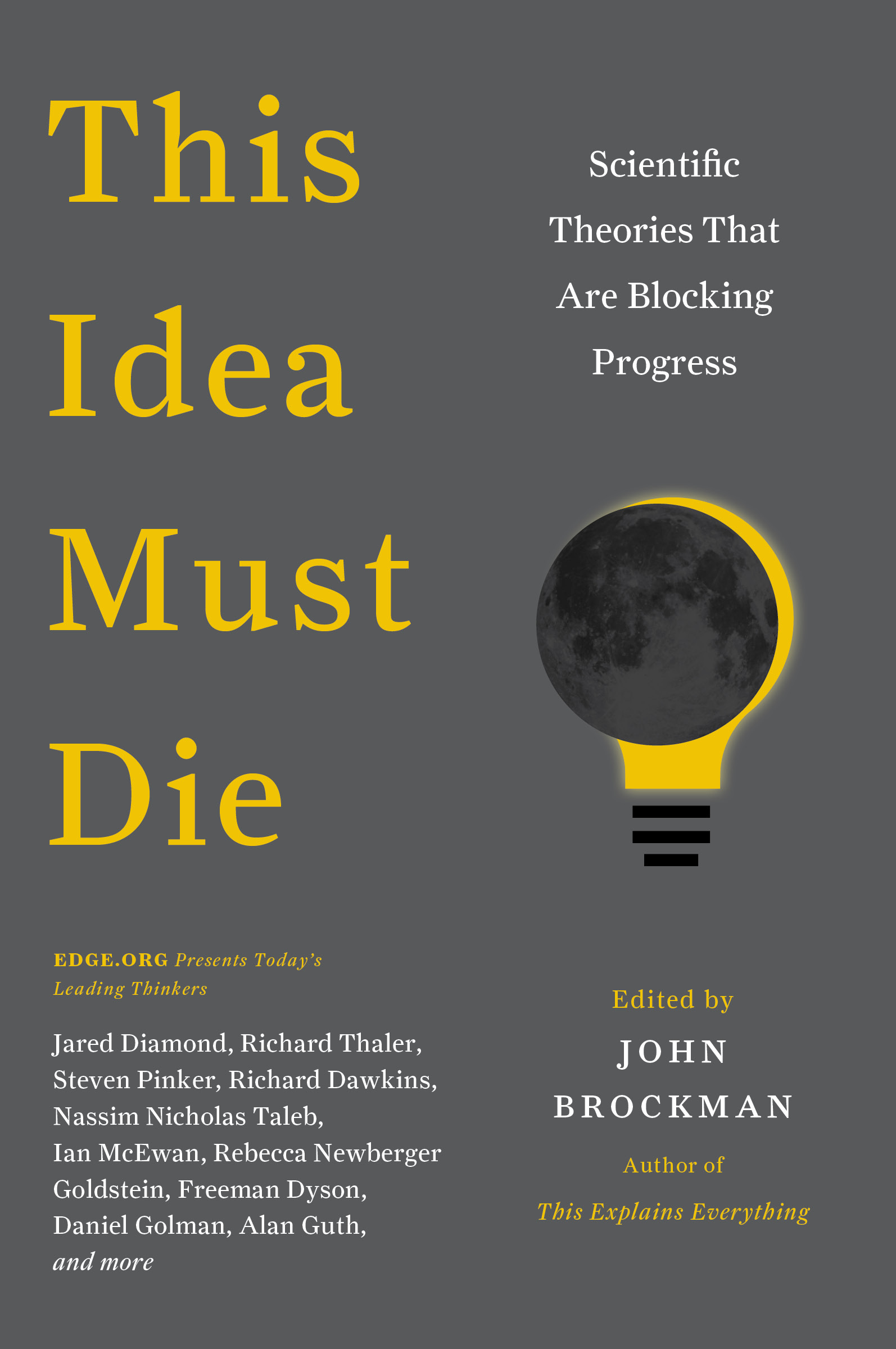 One detects no small Edge.org anthology. Each year, Brockman, the founder of the online science salon, poses a provocative question––last time, it was What Should We Be Worried About? (2014)—and invites leading scientists, philosophers, and artists to respond in concise and lucid essays. This time, he really struck a chord, inviting contributors to kill off scientific ideas that are outdated to the point of obstructing new advances. One hundred and seventy-five intellectual assassins eagerly stepped forward. ... Physics, statistics, robotics, linguistics, medicine—all are zestfully scrutinized in this exuberant, mind-blowing gathering of innovative thinkers, which includes even novelist Ian McEwan, who tries to try put the kibosh on the entire murderous exercise, declaring, "Every last serious and systematic speculation about the world deserves to be preserved."
One detects no small Edge.org anthology. Each year, Brockman, the founder of the online science salon, poses a provocative question––last time, it was What Should We Be Worried About? (2014)—and invites leading scientists, philosophers, and artists to respond in concise and lucid essays. This time, he really struck a chord, inviting contributors to kill off scientific ideas that are outdated to the point of obstructing new advances. One hundred and seventy-five intellectual assassins eagerly stepped forward. ... Physics, statistics, robotics, linguistics, medicine—all are zestfully scrutinized in this exuberant, mind-blowing gathering of innovative thinkers, which includes even novelist Ian McEwan, who tries to try put the kibosh on the entire murderous exercise, declaring, "Every last serious and systematic speculation about the world deserves to be preserved."

Bring together two hundred of the most powerful minds in one place and let them inspire each other, confront and learn—it's a great recipe to accelerate scientific progress in the world and a quite interesting way to spend time. But how to do it? Even 30 years ago, such a project would not have a chance. The Internet radically changed this situation. In 1996, a New York literary agent John Brockman established the website Edge.org. It's an extraordinary cul-de-sac in the global network, which sooner or later gets everyone fascinated by the most advanced content on science, technology and society.
For website Edge.org publishes the writings and record videos of absolutely exquisite people, primarily leading American and British scientists, including Nobel Prize winners, as Frank Wilczek, Eric Kandel, Daniel Kahneman and George Smoot. A significant contribution by the science popularizors: writers, journalists and the golden children of Silicon Valley, who introduce the rest of the world to new technologies.
All this, the incredible group and its works, are managed by John Brockman—the man whose biography complies with the idea of the American dream. . . .

Why scientists need to stop worrying about whether or not everything in biology serves a purpose.
John Brockman, the publisher and science impresario who runs the online science and culture salon Edge.org, has asked his provocative, annual Edge question: What scientific idea is ready for retirement? "Few truly new ideas are developed without abandoning old ones first," Brockman writes. "What established scientific idea is ready to be moved aside so that science can advance?"
Here’s my candidate for forced retirement: The idea that we need to distinguish between things in biology that are there for a purpose and those that aren’t.

Cosmologist Sean Carroll is one of many who have recently answered the annual question posed by Edge.org, which this year was: What scientific idea is ready for retirement? Sean, whom I’ve met at the Naturalism workshop he organized not long ago, and for whom I have the highest respect both as a scientist and as a writer, picked “falsifiability.”
Which is odd, since the concept — as Sean knows very well — is not a scientific, but rather a philosophical one.
Now, contra some other skeptics of my acquaintance, at least one of whom was present at the above mentioned workshop, Sean is actually somewhat knowledgable and definitely respectful of philosophy of science, as is evident even in the Edge piece. Which means that what follows isn’t going to be yet another diatribe about scientism or borderline anti-intellectualism (phew!). ...
LES COULISSES DE LA PAILLASSE. Quelles sont les théories scientifiques qui devraient être mises au placard ? C'est la question qu'a posée dans son "défi" annuel le site Edge (Edge.org), un forum de discussion sur la science : le but est d'accélérer le progrès de nos connaissances.
Le débat scientifique peut en effet donner lieu à des situations de blocage, comme celle décrite par Max Planck, un des pères de la mécanique quantique. Il expliquait qu'il avait été incapable de persuader le chimiste germano-balte Wilhelm Ostwald que la deuxième loi de la thermodynamique (augmentation de l'entropie) ne pouvait pas être déduite de la première (la conservation de l'énergie). "Cette expérience me donnait aussi l'occasion d'apprendre un fait remarquable : une nouvelle vérité scientifique ne triomphe pas en convainquant ses opposants et en leur faisant voir la lumière, mais plutôt parce que ses opposants finissent par mourir, et arrive une nouvelle génération qui est familière avec la nouvelle idée."

These scientific ideas will drive you crazy
Much has been made of this year's question at John Brockman's Edge, generally described as an online salon. Brockman asked for recommendations about which scientific ideas should be retired, and some 170 salonists replied. Dennis Overbye plucked up a few proposed discards for consideration at Out There, concluding, "No matter who you are, you are bound to find something that will drive you crazy."

The 2014 Edge Annual Question (EAQ) is out. This year, the question posed to the contributors is: What scientific idea is ready for retirement?
As usual with the EAQ, it provokes thought and promotes discussion. I have only read through a fraction of the responses so far, but I think it is important to highlight a few Edge contributors who answered with a common, and in my opinion a very important and timely, theme. The responses that initially caught my attention came from Laurence Smith (UCLA), Gavin Schmidt (NASA), Guilio Boccaletti (The Nature Conservancy) and Danny Hillis (Applied Minds). If I were to have been asked this question, my contribution for idea retirement would likely align most closely with these four responses: Smith and Boccaletti want to see same idea disappear — stationarity; Schmidt’s response focused on the abolition of simple answers; and Hillis wants to do away with cause-and-effect.

Kate Clancy, John Horgan and Ashutosh Jogalekar offered interesting replies to the annual Big Question from Edge’s John Brockman: What scientific idea is ready for retirement?

The latest assault on our uniqueness comes from Edge.org, which asked the world’s supposedly most “brilliant minds” to come up with ideas that should be retired in science.

SÜDDEUTSCHE ZEITUNG
FEUILLETON
Von Andrian Kreye
No. 15, Montag, 20. Januar 2014

Once a year, the New York literary agent John Brockman on his online forum for science and culture edge.org, asks one question. He gets answers from his network of scientists, intellectuals and artists. For 2014 was the question was "What Scientific Ideas Should We Retire?" Among the 174 responses received to date by the evolutionary biologist Richard Dawkins ("Essentialism"), the science historian George Dyson ("Science and Technology"), the neuro-scientist Sarah-Jayne Blakemore ("Left Brain/Right Brain"), as well as the response of the SZ-Feuilleton Editor, Andrian Kreye" Moore's Law.)

We must accelerate the pace at which science corrects itself. Because science can remain reliable. For this is as the strategic question that arises Edge this year, the community of researchers led by John Brockman: what scientific theories are ripe for retirement? Over 130 scholars - including Mihaly Csikszentmihalyi, Aubrey de Grey, Sherry Turkle, Nassim Nicholas Taleb, Stewart Brand, Richard Dawkins, Matt Ridley, Steven Pinker, George Dyson, Kevin Kelly - responded. Surprises abound. The findings are published edge.org .
Domingo, 19 2014
PAGE 5
DEBATES
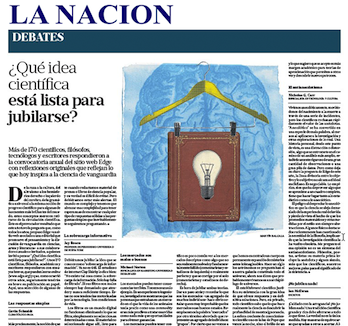
From culture to altruism, to the left and right hemispheres of the brain, to universal grammar, to the very notion of scientific progress: for some of the brightest minds in the world, these concepts deserve to retired from the scientific conversation.
This is the result provocateur who this year had the question which, like all the years, proposed Edge - a web site associated with a Publisher that promotes thought and discussion of cutting-edge science, arts and literature - partners usual and invited, to those invited to think "what scientific idea is ready to retire?". About 170 scientists, philosophers, academics and writers responded with brief essays, that they can be read online (www.edge.org) and that, like other years, they will probably soon its publication on paper. Here, a selection of some of the responses.
This is this year's provocative result of the question, which is proposed every year, by Edge, a website associated with a literary agent that promotes thinking and discussion of cutting-edge science, arts and literature, who invited his usual collaborators and guests , to think about "What scientific idea is ready to retire?". Some 170 scientists, philosophers, scholars, and writers responded with short essays that can be read online (www.edge.org) and, as has happened in previous years, will surely soon be published as a book. Here, a selection of some of the answers.
Simple Answers
Gavin Schmidt
Climatologist, NASAs Goddard Institute
Information Overload
Jay Rosen
Associate Professor of Journalism, New York University
Markets Are Bad; Markets Are Good
Michael I. Norton
Associate Professor of Marketing, Harvard Business School
The Illusion of Scientific Progress
Paul Saffo
Technology Forecaster
Certainty. Absolute Truth. Exactitude.
Richard Saul Wurman
Founder, TED Conference; eg Conference; TEDMED Conferences
Anti-anecdotalism
Nicholas G. Carr
Author, The Shallows and The Big Switch
Retire nothing!
Ian McEwan
Novelist; Author, Sweet Tooth; Solar; On Chesil Beach
Yesterday, I discussed some of this year's "Annual Question" answers at Edge.org, which was:
What scientific idea is ready for retirement?
The responses were a diverse set of scientific ideas from scientists and thinkers across a wide range of disciplines.
What scientific idea is ready for retirement? Read responses to that inquiry from the likes of Jared Diamond, Richard Dawkins, Alison Gopnik, Max Tegmark, Freeman Dyson, June Gruber, and many other brilliant people over at Edge.org, legendary book agent John Brockman's hub for really smart scientists and other big thinkers to share ideas with each other and the public. From the intro:
Science advances by discovering new things and developing new ideas. Few truly new ideas are developed without abandoning old ones first. As theoretical physicist Max Planck (1858-1947) noted, "A new scientific truth does not triumph by convincing its opponents and making them see the light, but rather because its opponents eventually die, and a new generation grows up that is familiar with it." In other words, science advances by a series of funerals. Why wait that long?
It is unrealistic to believe that everything science believes today will continue to be believed into the future ... and I frankly know of no scientist (except perhaps Sheldon Cooper) who believes such a thing. New evidence will cause scientists to revise the thinking and models, and the understanding of reality will shift accordingly. This is as it should be.
But which current assumptions or theories are, here and now, most ready to be retired?
That's the question posed by this year's "annual question" over at Edge.org. You can find the responses from the 176 respondents - amazing intellects from all over science and academia - over at the website, and they are all extremely fascinating.
"Take a look. No matter who you are, you are bound to find something that will drive you crazy."
...Here are some concepts you might consider tossing out with the Christmas wrappings as you get started on the new year: human nature, cause and effect, the theory of everything, free will and evidence-based medicine.
Those are only a few of the shibboleths, pillars of modern thought or delusions — take your choice — that appear in a new compendium of essays by 166 (and counting) deep thinkers, scientists, writers, blowhards (again, take your choice) as answers to the question: What scientific idea is ready for retirement?
The discussion is posted at edge.org. Take a look. No matter who you are, you are bound to find something that will drive you crazy. ...
...The whole thing runs more than 120,000 words. You can dip into it anywhere and be maddened, confused or stirred. If there is an overall point, it is that there is no such thing as a stupid question. ...

This year, I was invited to contribute to the Edge Foundation’s Annual Question. Other contributor include Helen Fisher, Irene Pepperberg, Alan Alda, Nina Jablonski, Jay Rosen, and, well 150 others: http://www.edge.org/responses/what-scientific-idea-is-ready-for-retirement
The question was, “What scientific idea is ready for retirement?”
My contribution: The Way We Produce And Advance Science

It's the start of the new year, and that means it's time for the Edge's annual Big Question — and as always, it's a provocative one. Nearly 170 prominent thinkers were asked: "What scientific idea is ready for retirement?" Here's what they said.
"Science advances by a series of funerals," writes Edge.org editor John Brockman. "Ideas change, and the times we live in change. Perhaps the biggest change today is the rate of change. What established scientific idea is ready to be moved aside so that science can advance?"

Unlike rock stars, scientific ideas do not usually burn out. They fade away and outlast their usefulness.
This is what motivated a new survey of 166 scientists and intellectuals, asking which ideas ought to be “retired” from science, not quite because they are wrong, but because they are old and ineffective, like nature versus nurture, left-brain versus right-brain, or carbon footprints.
As with Newton’s law of gravity, which gave way to Einstein’s, many of these ideas were once on the cutting edge, but have since been revealed as incomplete, outdated and bland. So the survey, released Tuesday by U.S. literary agent John Brockman, founder of the web salon Edge.org, is like spring cleaning for science. The point is to clear away junk, but sometimes you rediscover something useful under the couch.

Each year, the magazine Edge.org poses a question to the brightest minds on the planet. On this occasion, the editor John Brockman and his team has raised the following question: What scientific idea is time to retire? In the prestigious intellectual survey involved scientists from the likes of British biologist Richard Dawkins and the novelist Ian McEwan.
As explained in the Brockman own The Observer , Edge.org was founded in 1996 as the online version of The Reality Club, an informal meeting of intellectuals between 1981 and this year were cited in Chinese restaurants, artist studios , investment banks, dance halls, museums, halls and other places. "
Although events have moved into cyberspace, the spirit of Reality Club remains in the lively discussions back and forth on topical today pivots on intellectual debate issues, "says Brockman.
"The online salon Edge.org is hosted on a living document of the millions of words he produced conversation Edge in the last 15 years. Available for free to all Internet users."
To summarize the vision that inspires the draft annual Edge question, Brockman quotes a sentence of James Lee Byars: "To achieve great things, you have to look for extraordinary people."
"Through the years, Edge.org has had a very simple criterion for choosing their partners. Sought people whose creative work has expanded our understanding of what and who we are. Some are best selling authors and celebrities of mass culture. Most do not. preferstimulate work on the cutting edge of culture and research ideas that are not usually exposed. interested in us' think smart ', not the topics of' received wisdom, "Brockman says.
Here are some of the best answers to the Edge.org annual question, assigned to the online edition of THE WORLD through an agreement with the digital magazine. The responses of all participants in this project can be read in English here .
Pre-Publication Serialization
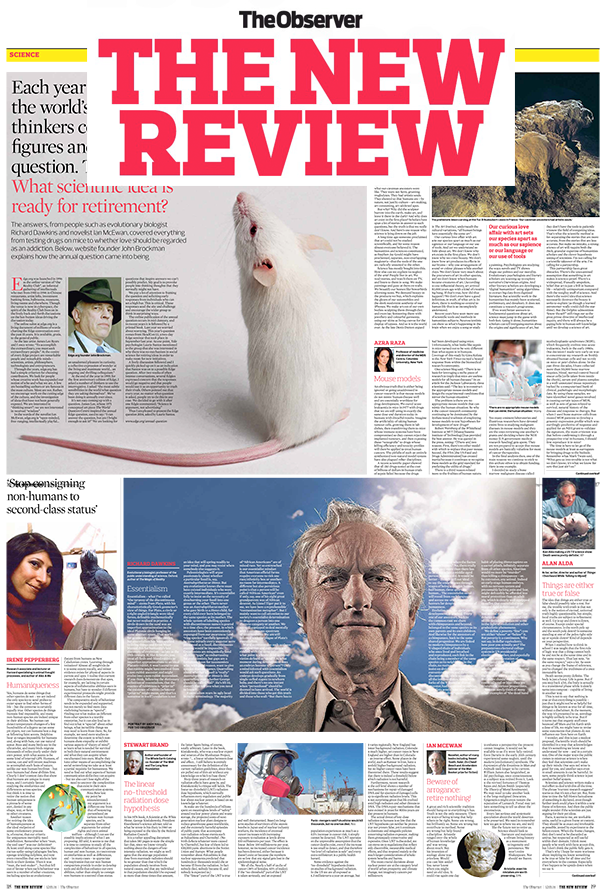
"The online salon at edge.org is a living document of millions of words charting the Edge conversation over the past 15 years. It is available, gratis, to the general public.
"As the late artist James Lee Byars and I once wrote: 'To accomplish the extraordinary, you must seek extraordinary people.' At the centre of every Edge project are remarkable people and remarkable minds—scientists, artists, philosophers, technologists and entrepreneurs."

Pre-Publication Serialization:

Every year, the American literary agent John Brockman asks the Cyber-Elite year the Edge question. Read a selection of the most exciting and surprising answers.

Be imaginative, exciting, compelling, inspiring: That's what John Brockman expects of himself and others. Arguably, the planet's most important literary agent, Brockman brings its cyber elite together in his Internet salon "Edge." We paid a visit to the man from the Third Culture.

At the age of three John Brockman announced: "I want to go to New York!" For decades he has been a leading light behind the scenes in the city's intellectual life. Foto wowe
...Like the idea of the Internet—which was slowly acquiring contours during these rambling 1960s discussions—the idea of Edge, the Internet salon around which Brockman's life now revolves, was also taking shape. Edge is the meeting place for the cyber elite, the most illustrious minds who are shaping the emergence of the latest developments in the natural and social sciences, whether they be digital, genetic, psychological, cosmological or neurological. Digerati from the computer universe of Silicon Valley aren't alone in giving voice to their ideas in Brockman's salon. They are joined in equal measure by other eminent experts, including the evolutionary biologists Richard Dawkins and Steven Pinker, the philosopher Daniel Dennett, the cosmologist Martin Rees, the biological anthropologist Helen Fisher, the economist, psychologist and Nobel Prize winner Daniel Kahneman, the quantum physicist David Deutsch, the computer scientist Marvin Minsky, and the social theorist Anthony Giddens. Ranging from the co-founder of Apple Steve Wozniak to the decoder of genomes Craig Venter, his guest list is almost unparalleled even in the boundless realm of the Internet. Even the actor Alan Alda and writer Ian McEwan can be found in his forum.
The bridge of the third culture
A question is sent out to all salon members at the start of every year. This year it is: "What scientific idea ready to be retired?" The "editorial marching orders," written by Brockman, reveal the heart of Edge: "Go deeper than the news. Tell me something I don't know. You are writing for your fellow Edgies, a sophisticated bunch, and not the general public. Stick to ideas, theories, systems of thought, disciplines, not people. Come up with something new, be exciting, inspiring, compelling. Tell us a great story. Amaze, delight, surprise us!" ...
[Continue using Safari/Firefox/Internet Explorer] [Continue using Chrome][
NOTE: Chrome auto-translate re-translates the English version on the FAZ webstie into a machine language translation.]


